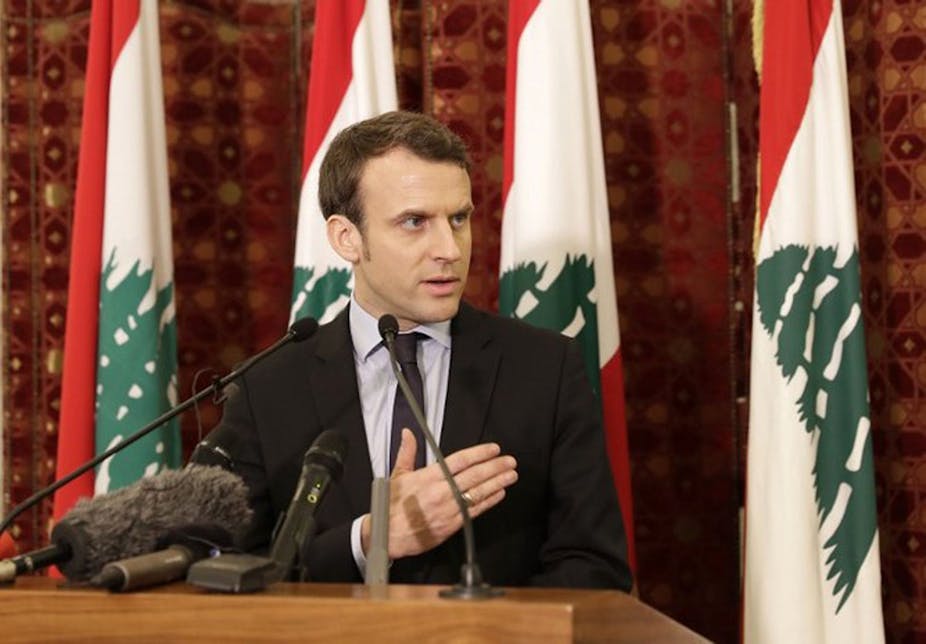With France now in the full swing of its presidential campaign, the importance for each politician to have a compelling narrative has never been clearer.
This is particularly true for Emmanuel Macron, the former finance minister who heads up his own political movement, called “En Marche!” (Forward!). He was the leading vote-getter of the first round on April 23, obtaining approximately 24% of the vote. Despite running outside country’s two mainstream political parties, he outdistanced extreme-right populist Marine Le Pen (about 22%), former prime minister Francois Fillon (20%), left-wing outsider Jean-Luc Mélenchon (19%) and Socialist Party candidate Benoît Hamon (6%).
While Macron served in the Socialist government of outgoing president François Hollande, he was never a member of the party, nor of the opposing Républicains. His August 2016 resignation sparked rumours of a presidential bid, and he finally declared his candidacy in November. He has worked to build his a candidacy around stories rather than ideas, and the first-round results validate his approach,
The concept found its way to France by way of a 2007 book by Christian Salmon, “Storytelling: The Machine for Creating Ideas and Forming Minds” and subsequently spread to political commentators. While the borrowed-from-English term “storytelling” is sometimes used here to describe routine political communications, the importance for candidates to create a narrative was understood, and Macron has taken the lesson to heart.
Macron has been called a “catch-all candidate” but it’s one thing to attract interest from across the political spectrum and another to win France’s highest office. What’s required is a communications narrative that brings it all together, and Macron has been working assiduously to build one.
We and us
To better understand narratives within the shifting range of political campaigns in France – from actions taken before candidacies are even declared into the primaries themselves and beyond – our research team developed a Twitter analysis methodology as part of the project #Idéo2017. In particular, we used the software program Tropes, which allows us to describe the style of a body of text – or tweets, in this case.
Our work focused on 500 tweets published by Emmanuel Macron’s account (@EmmanuelMacron) up to January 20, 2016. Summed up, the results are:
- Narrative: the tweets tell a story at a particular moment in time and in a specific place
Digging deeper into the tweets, the word “we” is particularly present. A comparison with the tweets from the account of François Fillon (@francoisfillon, candidate of the centre-righ Les Républicains, highlights the importance of “us” in Emmanuel Macron’s narrative. For example:
Here, “We need Europe” followed by “Europe makes us bigger and makes us stronger”. This is sometimes combined with “you”, bringing readers into the narrative:
“The spring will be ours”, Macron tweets, a reference to the upcoming May election. “You will triumph for our ideas”.
Macron’s narrative falls within a framework of continuous movement, embodied in the very name of Macron’s policial group, “En marche!”, which I analysed earlier.
We combine the use of “we” and the feeling of a political movement being “set in motion” with the themes being evoked to better understand the narrative Macron and his team are working to build. This emerges visually on the word cloud extracted from within the body of tweets:

The most common words – “Europe”, “France”, “French”, “country” – are combined elements that evoke the physical context of the story being told (“enmarchebordeaux”, “macronlille”, “macronclermont”) and supported by more programmatic elements (“work”, “revolution”, “health”).
Characters, scenery and a man of action
This is further elaborated on the following graphic, which highlights Macron’s major themes:

The two central columns concern Europe (column 1, with verbs like “take”, “act”, “render”, “re-create”) and France (column 2, with terms such as “project”, “emancipation”, “build”) and have the greatest lexical proximity. Thus, the narrative being proposed to French citizens links them to Europe, through which the changes and proposals largely pass.
By analysing the relationships between categories, it is possible to separate elements within the tweets between those that take action and those that are acted upon: “Macron” and “enmarche” (his party) are change agents, while “Europe”, “French”, “nation”, “project”, or “work” are being acted upon. This acting-on/acted-upon dynamic can be seen in the following tweets:
Marcron tweets: “I want unemployment protection to become a universal protection.” Another example follows: “Because I’m the candidate of those who work, I want to simplify the regulations for those who create and innovate.”
Or in this tweet:
Here Macron writes, among other things: “Today I defend one sovereign Europe, one Europe that unites its people.” Linguistically, the connection of action to politics is explicit.
Creating the narrative thread
A cloud of words in category 4, relating to Macron’s proposed political program, brings this home:

Many of the terms relate to employment and the economy, as well as the actors within these themes – “employee”, “company”, “student”). Within these tweets, Macron does the following:
Sketches out a landscape (France and more generally Europe) that itself requires certain postures and actions;
Places himself as the active player within the setting who is the driving force of action;
Interacts with a range of others, performing actions generated by the narrative thread.
While some recent polls show Macron as one of the leading candidates – particularly as François Fillon’s difficulties worsen – it’s hard to say how this might play out in the election itself, particularly given recent polling difficulties in other countries.
In his campaign for presidency of France, Macron is very much developing a narrative, with a range of tools widely used today in storytelling. And the psychological and cultural dimensions of the narrative – familiar stories, persuasiveness, projection and emotion – help explain its current success.
Translated from the French by Leighton Walter Kille.


